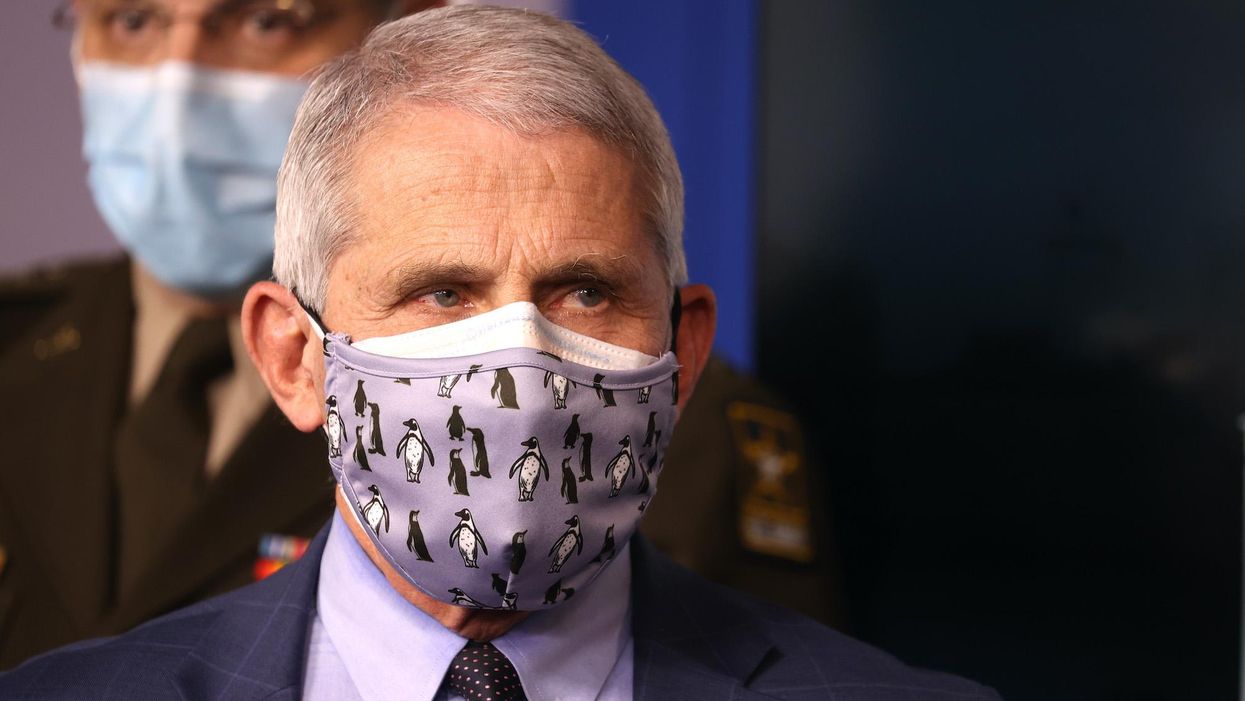
Photo by Tasos Katopodis/Getty Images

Can we get a straight answer?
Dr. Anthony Fauci recently revealed to the Washington Post that he and his wife will be celebrating Christmas alone because of the pandemic. After sharing that this kids would not be making the trek home for the big day, the doctor offered a warning about Christmas celebrations.
He said, the Post reported, that holiday revelries could cause a coronavirus spread that is worse than what we saw at Thanksgiving, when millions of Americans ignored suggestions to stay home and avoid gatherings.
Fauci said the country cannot afford to "run away from the data" even though it will be painful to miss time with family.
Following the publication of the interview, reports came out that the National Institute of Allergy and Infectious Diseases chief was calling for Americans to cancel Christmas.
But Fauci told Fox News host Bill Hemmer on Thursday that such claims are "nonsense."
"I've heard and seen tweets saying, 'Fauci says cancel Christmas,'" he stated. "Nonsense. I've never said that."
However, he said something else to the BBC.
After sharing with BBC's "Newsnight" that he believed people should curtail travel and keep gatherings and dinners as small as possible, the show's hosts asked if he was pulling a Grinch.
"It is a cancel Christmas message in effect?" they asked.
Fauci replied, "Yes, in some respects it is, unfortunately."
A couple of days later, Fauci said there is no need to cancel Christmas. The doctor said his statements were simply intended to be a warning that would urge folks to be careful when it comes to gatherings.
"I'm not saying that everyone should cancel the family gathering, I'm saying that people will need to make individual choices," Fauci said.
"When you're talking about having a congregate setting for dinner — not cancel the family aspect — but you have some Christmas dinners people bring friends and others in who travel from different parts of the country. You could have 15, 20 people at a dinner. That's really somewhat risky," he continued. "You can do a modified version of that."
“You don't have to cancel things — you can still spend time with your family," Fauci said later. "I'm just asking people to be careful when it comes to travel that may not be necessary, travel that you can avoid. And when you get together, try to make some limitation to it."
Hemmer pressed Fauci about New York's recent efforts to battle COVID-19, which the doctor has praised.
Specifically, the host pointed out that restaurants and bars — according to Democratic Gov. Andrew Cuomo's own data — have been responsible for less than 1.5% of viral spread in recent months, yet the governor ordered indoor dining to be closed, and New York City Mayor Bill de Blasio threatened that a full-blown lockdown is a possibility.
"You've got all these people out of work and all these restaurants closed. I mean, do you really think that New York has made the best decision?" Hemmer asked.
Fauci answered that though he does support closures that would help slow transmission of the virus, he does think there needs to be relief for businesses that are impacted.
Well, you know, what we really need to do is make sure when we say limit restaurant capacity or close restaurants or close the bars, that has to be accompanied by relief, financial relief for the restaurant owners and the bar owners. Because certainly if you do that, if you shut down those establishments, you're going to diminish the transmissibility of infection. But you can't do it in a vacuum. You've got to help those people out. They've got to get some relief.
Otherwise, they may not be able to recover from the fact that you're asking them to shut down. You've got to keep those two things together. You can't just say shut down and walk away.
He added that he has been vocal about telling Congress, "We can't ask people to participate in a public health measure that unquestionably is damaging to their financial solvency without coming in and trying to help them."